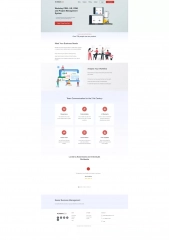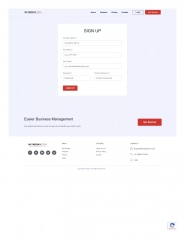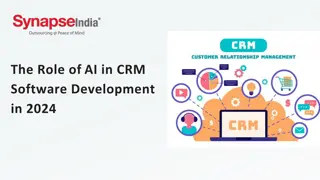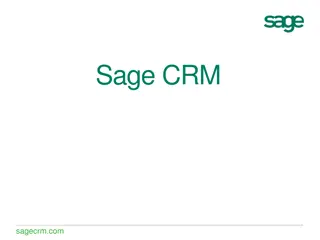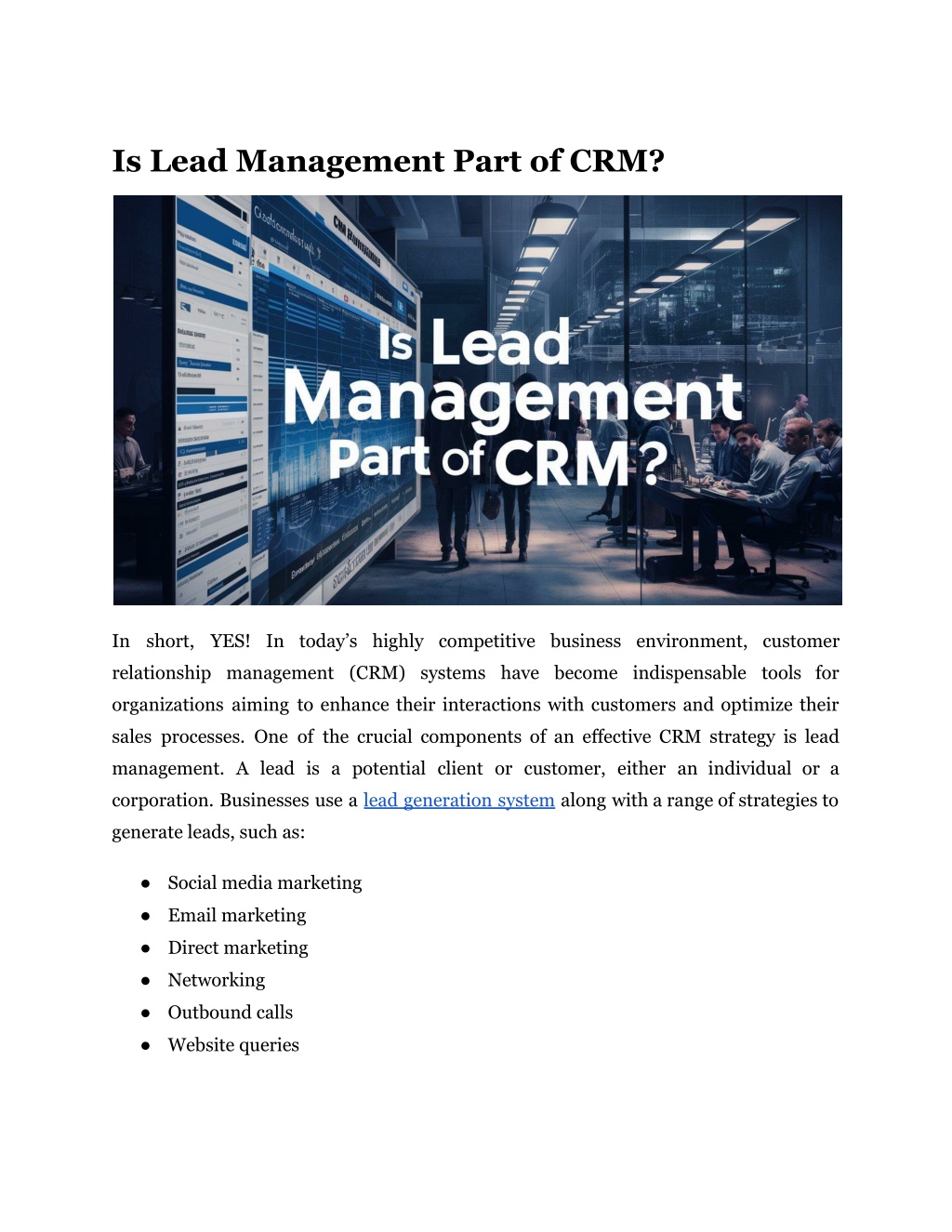
Is Lead Management Part of CRM?
Discover how lead management integrates with CRM systems. Learn why it's crucial for business growth and customer relationships.
Download Presentation

Please find below an Image/Link to download the presentation.
The content on the website is provided AS IS for your information and personal use only. It may not be sold, licensed, or shared on other websites without obtaining consent from the author. If you encounter any issues during the download, it is possible that the publisher has removed the file from their server.
You are allowed to download the files provided on this website for personal or commercial use, subject to the condition that they are used lawfully. All files are the property of their respective owners.
The content on the website is provided AS IS for your information and personal use only. It may not be sold, licensed, or shared on other websites without obtaining consent from the author.
E N D
Presentation Transcript
Is Lead Management Part of CRM? In short, YES! In today s highly competitive business environment, customer relationship management (CRM) systems have become indispensable tools for organizations aiming to enhance their interactions with customers and optimize their sales processes. One of the crucial components of an effective CRM strategy is lead management. A lead is a potential client or customer, either an individual or a corporation. Businesses use a lead generation system along with a range of strategies to generate leads, such as: Social media marketing Email marketing Direct marketing Networking Outbound calls Website queries
A Sneak Peek of CRM Customer Relationship Management (CRM) refers to the strategies, practices, and technologies that companies use to manage and analyze customer interactions and data throughout the customer lifecycle. The goal of CRM is to: Improve customer service relationships Assist in customer retention Drive sales growth CRM systems like Salesforce lead generation systems compile data from a range of communication channels, including a company s website, telephone, live chat, and marketing materials. By aggregating this information, CRM systems provide businesses with detailed insights into customers' preferences and behaviors. Read More Articles: What is a Salesforce CRM Consultant? What is Lead Management? (Image reference - We can display stages like these)
Lead management is the process of capturing, tracking, and managing prospective customers (leads) from the point of initial contact to the point where they become customers. The lead management process typically involves the following stages: Lead Generation: Identifying and attracting potential customers through various channels such as websites, social media, events, and advertisements. Lead Capture: Collecting information about the leads, such as contact details and preferences, usually through forms, sign-ups, or direct interactions. Lead Tracking: Monitoring and recording interactions with leads to understand their interests. Lead Qualification: Assessing and categorizing leads based on their likelihood to convert into customers, often using criteria like budget, authority, need, and timeline (BANT). Lead Distribution: Assigning leads to the appropriate sales representatives or teams based on factors such as geography, product interest, or sales rep expertise. Lead Nurturing: Engaging and building relationships with leads through personalized communication, content, and offers to move them closer to a purchasing decision. Lead Conversion: Transforming qualified leads into customers through successful sales interactions. Is Lead Management Part of CRM? Yes, lead management is an integral part of CRM. A comprehensive CRM system not only manages existing customer relationships but also facilitates the management of potential customers through the lead management process. Here s how lead management fits within the broader scope of CRM: 1. Integration of Lead and Customer Data CRM systems consolidate both lead and customer data into a single platform. This integration determines that all information related to a lead's journey, from initial
contact to conversion, is accessible in one place. Sales and marketing teams can view a complete history of interactions and communications with the assistance of lead management Salesforce, which allows for: More informed decision-making Personalized engagement 2. Streamlined Sales Processes By incorporating lead management into CRM, organizations can expedite their sales processes. Automated workflows within CRM systems can handle repetitive tasks such as: Lead assignment Follow-up reminders Email sequences This automation saves time and reduces the risk of human error, thereby enabling sales teams to focus on high-value activities such as: Closing deals Building relationships 3. Enhanced Lead Qualification CRM systems often include tools and features that assist in lead qualification. For example, lead scoring models can be implemented within CRM to assign scores to leads based on predefined criteria such as: Engagement level Demographic information Behavioral data This scoring helps sales teams prioritize leads that are most likely to convert, ensuring that resources are allocated effectively.
4. Improved Collaboration Effective lead management requires collaboration between sales, marketing, and customer service teams. CRM systems facilitate this collaboration by providing a unified platform where all teams can access and update lead information. This transparency ensures that everyone is aligned and working towards the same goals, which ultimately boosts overall efficiency and effectiveness. 5. Data-Driven Insights A CRM lead generation system has robust reporting and analytics capabilities that provide insights into the performance of lead management activities. You can track key metrics like: Lead conversion rates Lead response times The effectiveness of different lead generation channels These insights enable continuous improvement and optimization of lead management strategies. 6. Personalized Communication Personalization is key to successful lead nurturing. CRM systems store detailed information about leads, including their preferences, behavior, and interaction history. This data: Let sales and marketing teams tailor their communication Offers to the specific needs and interests of each lead Increases the likelihood of conversion Read More Articles: What Is Salesforce Optimization?
Benefits of Integrating Lead Management into CRM Integrating lead management into CRM offers numerous benefits that can drive business success: 1. Increased Efficiency Automation of lead management tasks within CRM systems increases operational efficiency. Sales reps can focus on engaging with leads and closing deals rather than spending time on administrative tasks. This efficiency leads to faster response times and improved productivity. 2. Higher Conversion Rates A well-managed Salesforce lead generation process ensures that leads are nurtured effectively and followed up promptly. By using CRM tools to qualify and prioritize leads, sales teams can: Focus on high-potential prospects Achieve higher conversion rates and increased revenue 3. Better Customer Relationships By integrating lead and customer data, CRM systems provide a comprehensive view of each customer s journey. This holistic view enables you to build stronger relationships with leads and customers, ultimately fostering: Loyalty Long-term engagement 4. Informed Decision-Making Data-driven insights from CRM systems enable organizations to make informed decisions about their lead management strategies. By analyzing performance metrics and trends, companies can identify areas for progress and adjust their approaches to achieve better results.
5. Scalability As businesses grow, managing an increasing number of leads can become challenging. CRM systems are designed to scale with the business and provide the tools and infrastructure needed to handle a larger volume of leads without compromising on quality or efficiency. The Final Note Lead management is undeniably a crucial part of CRM. By integrating lead management processes within a CRM system, you can accelerate your sales and marketing efforts, elevate lead qualification and nurturing, and maximize your conversion rates. The synergy between lead management and CRM guarantees that businesses can effectively manage their relationships with both prospective and existing customers to drive growth and success in a competitive market. Want to reach your ideal audience and gain potential leads? Our team of professionals has got you covered! At WhiteRock, we aim to generate sales and revenues by converting leads with our lead management Salesforce systems. Site Article: Is Lead Management Part of CRM?


